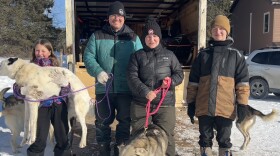State lawmakers are considering a bill that would allow drones to help treat crops on Connecticut farms.
The proposal has gathered the support of a broad coalition of farmers and academics, who say these “flying tractors” could make their jobs cheaper, easier and more environmentally-friendly.
“This is to prevent the over-application, and broad spraying, that is typically done with airplanes or other aircraft,” State Rep. Doug Dubitsky, a Republican representing Chaplin, recently told members of the Connecticut Environment Committee. “This allows for very precise application, not only to single plants, but actually to a single part of a single plant.”
Under the proposal, commercially-licensed drone pilots would be allowed to use drones to apply pesticides and fertilizers. Supporters say the technology would also reduce labor costs while also offsetting the high cost of operating ground-driven sprayers.
“A low-flying agricultural drone is essentially a ‘flying tractor,’” wrote Tracey McDougall, executive director of the Connecticut Farm Bureau, in a letter to lawmakers supporting the bill. “Legalizing drone spraying in Connecticut will bring our state's agricultural practices into the 21st century, benefiting our farmers, our environment, and our economy.”
State Rep. Brandon Chafee, a Democrat representing Middletown, told lawmakers he supported moving the bill out of committee, but expressed concerns about how the drones would handle spraying on a windy day.
“My main concern is – depending on the wind speed and direction – it’s going to disperse the pesticides more,” Chafee said.
Drones use GPS and other technology to allow for precise applications of chemicals, Dubitsky said.
Connecticut farmers have been exploring the use of drones in agriculture for several years. Farmers have hailed the technology as a time and money-saver, allowing them to efficiently analyze rows of crops for disease and automate certain agricultural tasks.
The bill was passed out of the Environment Committee last week. It still awaits a vote before the broader General Assembly.








